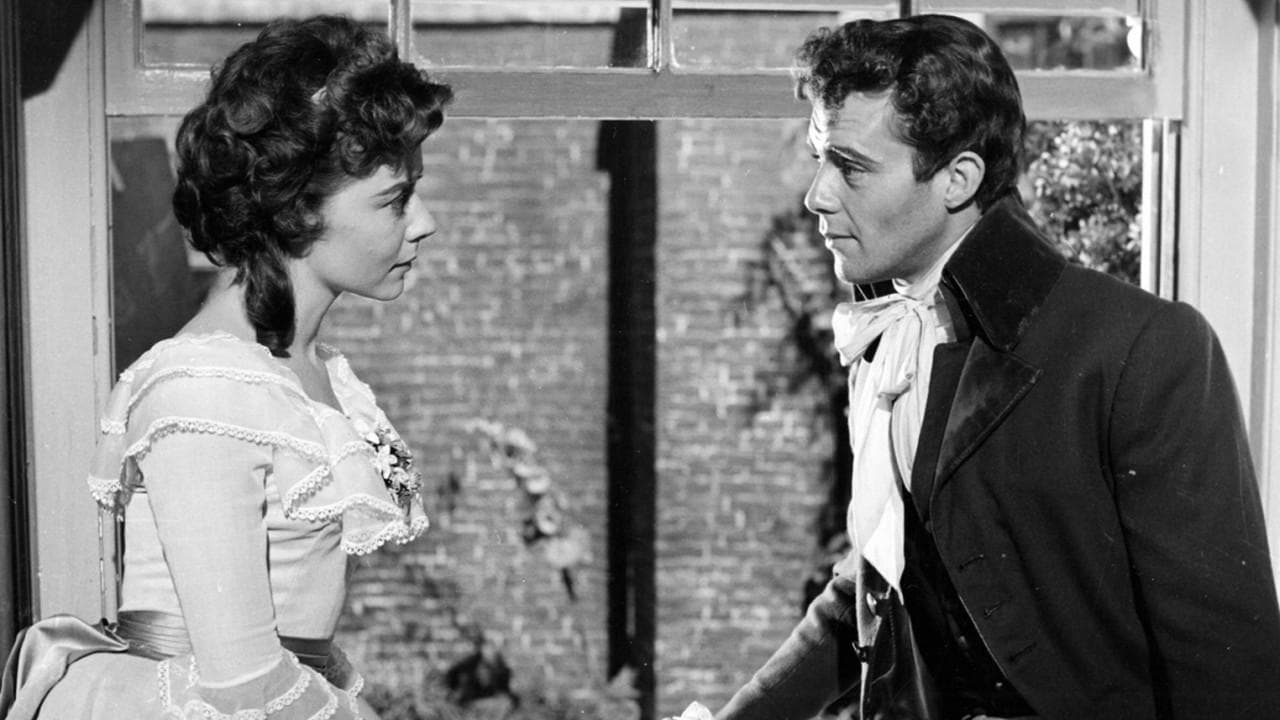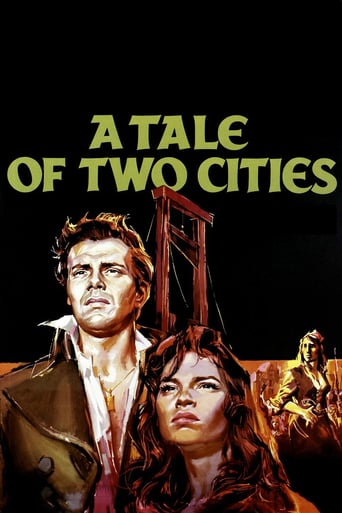

Too much of everything
... View MoreOne of my all time favorites.
... View MoreGood concept, poorly executed.
... View MoreThis movie was so-so. It had it's moments, but wasn't the greatest.
... View MoreI'm old now, and I've been watching films (movies!) since the 1940's!This black and white 1958 version of 'A Tale of Two Cities' is a beautiful love story. Although we owe the wonderful Charles Dickens all the credit for creating such an outstanding act of bravery by Sydney Carton, I defy anyone to suggest a better actor than Dirk Bogarde to play this part.Dirk Bogarde starts the film as a drunk who has nothing to live for. Through his love for Lucie, he learns to redeem himself. The words he dictates at the end of the film to Charles Darney in the prison, 'I knew it was not in your nature.....' are real tearjerkers.I watch the film at least once a year and always find it a moving experience.Highly recommendedPS The haunting music by Richard Addinsell is fabulous.....
... View MoreThis is my favourite Dickens book and my favourite Dickens dramatisation. I remember reading that there had been some doubts originally whether Dirk Bogarde matinée idol could manage this part. Instead it was presumably his first chance to show the inimitable quality of his acting. He is perfect in this part and I cannot imagine anyone else ever doing it better although I'd guess Ronald Coleman could equal it. I've seen one other, more recent version and although Carton's actor had a good go at it, it totally lacked the amazing charisma Bogarde provided for what is one of Dickens' most poignant characters - flawed, fascinating, cynical, damaged but wonderful.It's a crying shame this wasn't filmed in colour since the producers did consider doing so and then didn't. But the production and acting are so excellent that you soon don't notice it isn't colour as you become completely immersed in the movie. I suppose it's always possible the lack of colour actually enhances the drama, and for me this story is the most dramatic and poignant of all Dickens - a work of pure genius.
... View MoreAs an avid admirer of nineteenth century novelist Charles Dickens' work, with an interest in the French Revolution, then I felt compelled to watch this Rank adaptation of; A Tale of Two Cities, directed by Ralph Thomas. Although I have not yet read the original novel, I got the impression that this film adaptation of; A Tale of Two Cities stuck as much as possible to the original novel as Dickens intended it to be.We see in this film adaptation of; A Tale of Two Cities the social origins which culminated in the French Revolution. It illustrates the traditional aristocratic 'ruling class's' demise. The demise of the French aristocracy resulted in a reaction by them, where their fears and anxiety pertaining to their precarious position in society culminated in the mistreatment of the ordinary people of France, otherwise referred to as; 'serfs'. Encouraged by the American War of Independence, and influenced by the intellectual elite of The Enlightnement movement culminated in the French Serfs rebelling against the causes of their imposed position within an undemocratic, feudal society, which permitted their mistreatment by the aristocracy. It is the factors of mistreatment and being restrained by their inability to change their situation via the democratic processes we have today, which caused the French serfs to overthrow the aristocratic ruling class at that time in the Eighteenth Century. The over-throwing of the French aristocracy subsequently made way for a new elitist ruling class to emerge in the form of industrialists and businessmen, thereby creating a new type of class consciousness for modernity.As to the acting in the film, it is an eclectic bunch of British character actors playing the parts. This is exemplified by the part played by Dirk Bogarte, who makes the character he plays a portrayal of himself, as opposed to immersing himself into the character, and becoming it! Bogarte illustrates that he is able to become the character he plays in such films as; The Blue Lamp' (1950), where he acts the part of villain Tom Riley with a real and definite intensity. If there was to be any accolades for acting in; A Tale of Two Cities, it would go to the actor, Christopher Lee who played the part of the bombastic French nobleman,Marquis St. Evremonde .If the film is going to be defined as worthy of watching, it is due to the director's ability to keep close to the original Dickens novel.
... View MoreThis is a classic film version of one of Dickin's classic novels. Arguably his best novel (though the critics tend to dismiss it - it has a straightforward plot and structure), it translates into an exceptional film. For those who don't know the story, it concerns the fortunes of the Manette and St Evremonde families at the time of the French revolution. In a Romeo and Juliet type situation, Charles Darnay (alias St Evremonde) loves Lucie Manette, whose father Darnay's uncle had wronged. Now living in London, neither can escape the terrible events in Paris, and they are drawn to a climatic conclusion as the guillotine falls on aristocrat and commoner alike.The real hero of both novel and film is Sydney Carton (Dirk Bogarde), an English lawyer who initially defends Charles Darnay against a charge of treason, and later comes to love Lucie, now married to Darnay. The conclusion of the story, for Sydney Carton at least, is both tragic and inspiring, and Mr Bogarde certainly does justice to the role.
... View More